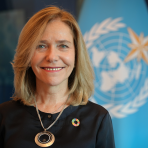Opening remarks - Setting the scene: Collective Progress toward Early Warnings for All
Excellencies, colleagues, distinguished partners,
Thank you for joining us today for the launch of the Global Status of Multi-Hazard Early Warning Systems 2025 report.
I would like to begin my statement with a thought-provoking question.
A recent UN report said that UN reports are not widely read. Many receive fewer than 1,000 downloads. And downloading doesn't necessarily mean reading.
So why is the report we are launching today any different?
Why does it matter to the families in Jamaica who just lost everything, to the evacuated villagers in the Philippines, and the flooded farmers in Viet Nam?
It matters because it shows that early warning systems are saving lives from tropical cyclones and other hazards. It tracks the progress and shows how far we still have to go. Today we will present the key findings.
Firstly: Early warnings work.
Disaster-related deaths are six times lower in countries with good early warning coverage. At the same time, the number of people affected by disasters continues to rise because of more extreme weather and climate hazards.
Secondly: We are making measurable progress in all regions.
More than 60% of countries now report having Multi-Hazard Early Warning Systems. But we need to do more. Vulnerable regions continue to be the least protected. This is unacceptable.
And we CAN do more. We have the knowledge and the tools. We just need the commitment. Another finding confirms what we have known in WMO for over 150 years: effective data sharing within and between countries is essential. Collaboration and coordination – based on trust - are driving the expansion and acceleration of Early Warnings For All.
Ladies and gentlemen,
We are at the dawn of a technological revolution which will change the way we issue, share and act on early warnings. We need to ensure that all countries have access to innovation and that nobody is left behind. Let’s close the digital divide.
Finally, we are making progress in closing weather and climate data gaps, in observing and forecasting capabilities. Just yesterday, Spain, Ireland, Belgium and the Netherlands announced an additional US 30 million dollars for the Systematic Observations Financing Facility. This is great, but more is needed. I welcome the fact that SOFF is innovating climate finance through the creation of the Systematic Observation Impact Bond, as part of the COP30 Presidency Action Agenda.
The new Climate Risk and Early Warning Systems Initiative (CREWS) Strategy 2030 provides a practical roadmap which will make a real difference on the ground in LDCs and SIDS. It will scale up financing and innovation to make early warning services more effective and accessible. Thank you to Canada, France and U.K. for their leadership and to Norway, Monaco and Luxembourg for their recent contributions, and other donors for their support.
Finally, emerging hazards bring additional challenges. And while improvements in digital infrastructure are helping warnings to reach more people, we need to ensure this is sustainable.
Excellencies,
I would conclude by saying that Global Status of Multi-Hazard Early Warning Systems 2025 report does matter. It informs community mobilization, evacuations, anticipatory action and catastrophe bonds in places like Jamaica and the Philippines.
So please download the report, Read the report. And act on it.
Early warnings work. They must work for everyone, everywhere and all the time.
Thank you
Statement by


